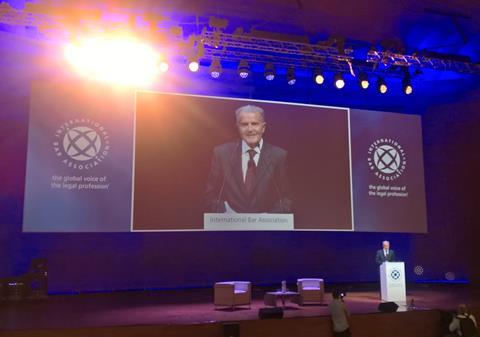Former European Commission president Romano Prodi told the global bar this morning that Brexit will be 'painful and difficult’ – but dismissed Remainer hopes for a second referendum. Prodi also doubts the result would be different second time around anyway, given his experience of UK ‘exceptionalism’.
Prodi, who led the commission from 1999-2004 and was twice prime minister of Italy, also warned delegates that liberal democracies everywhere are 'under threat. ‘From the Philippines to China, from the EU to the US, people seem to be more and more uneasy with the traditional political parties and decision’making,’ he said. ‘Everywhere there is a desire for authority.’

Populist movements across Europe are exploiting the perceived negative consequences of globalisation, said Prodi. He cited inequality, ‘which has risen everywhere in the last generation’, despite GDP growth; pressure on the salaries of ‘middle-range’ workers; the political impossibility of running domestic political campaigns on the promise of higher taxes; mobility of capital in an era where labour is far less mobile; and technological advances.
Prodi said the European project has now been ‘frozen’. Fears of a loss of identity at nation state level have led to a transfer of power from the European Commission to the European Council comprising heads of state, he added. ‘The European Union was the symbol of shared progress in the defence of rights and the visible instrument of a new social justice in a continent devastated by wars. But things changed,’ he said.
On Brexit, Prodi expects a ‘compromise’ that will safeguard free trade, with sacrifices in areas such as freedom of movement and joint social projects.
He added: ‘We are in a very difficult situation. I don’t believe the referendum will be repeated – I can’t imagine how you could do it. A great part of world - including India - [looked] at Europe wearing British glasses. We will have to reshape the union. We have no alternative. Negotiation will be tough but I believe there will be a compromise. It will not be easy because we [have] thousands of different laws and bills and to split them will be painful and difficult. Even if we try and find a win-win we will end up with lose-lose.’
Asked at a Q&A to enlarge on his Brexit observations, Prodi said the process has already created a ‘new dynamic’ in relations between member states. ‘When you have a marriage split all the small problems come out,’ he said. ’In Italy we we were fighting for the pharmaceutical authority and that creates a dynamism that will not be positive.
‘As to the idea of repeating the referendum, I am doubtful the result will be different. My experience at the European Commission was that every day I had to deal with British exceptions on small things. I doubt politically you can do it. The two big parties are split so it is difficult.’
Prodi also lamented the decline in the status of supranational bodies, observing that the ‘idea of Europe’ has less leverage in the world at large. At a recent meeting of the UN, said Prodi, President Putin did not even show up and the one global leader who did – president Trump – berated the institution Prodi described this as ‘incredible’.





























2 Readers' comments